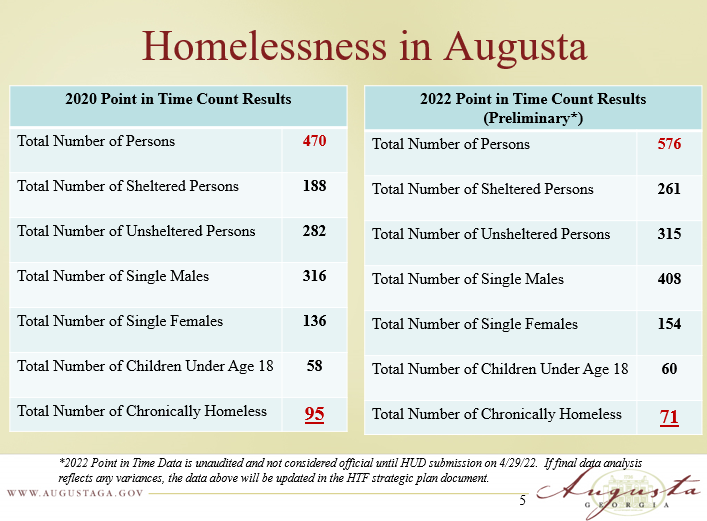The Augusta Commission is expected to vote during its March 30 meeting on the strategic plan to address homelessness in the city.
Most commissioners, along with Mayor Hardie Davis Jr., spent just over two hours on March 24 reviewing recommendations from the task force that was co-chaired by commissioners Jordan Johnson and Dennis Williams.
“I’m proud of the team. I’m proud of the community because this has been something that we worked on for a year,” Johnson said. “We started with nothing and now we’re ending with a plan that I think would change Augusta for the for the for the better. It’s a comprehensive plan. It’s the first in 18 years. And so, I’m extremely proud of the work that we’ve done.”
In addition to the recommendations, the strategic plan provided the first look at the results of the Point-in-Time count conducted in Richmond County in late February.

“The chart on the right does demonstrate what we have seen to be an increase in homelessness since the last full Point-in-Time count in January of 2020. An increase of over 100 total persons, an increase of nearly 100 single men in our community experiencing homelessness,” Daniel Evans, Planning Development Supervisor from Augusta’s Housing and Development department said. “These numbers are estimates but they do show what our eyes see every day. Homelessness has become an increasingly visible concern within the community.”
“Quite frankly, I expected the number to go higher,” Johnson said. “The reason I say that is because if you go into an encampment, and you see six separate sections in one encampment, but you only see two people, you can only count two people. The other three are not accounted for. So, there are others out there. That does not take into account folks living in cars, that does not take into account folks living on grandma’s couch, that does not take into account folks that we don’t even know are out here.”
One thing the plan did not recommend was for the city to build a non-congregant shelter.
It instead calls for developing a permanent supportive housing initiative, using local, federal and private resources to create 50-75 new units by 2025. Evans said Augusta could use the $3.1 million allocated to the city by the HOME-ARP award, money received through the American Rescue Plan Act.
Johnson admitted that was an unexpected curveball.
“We all were excited about having this shelter in the city, and that’s fine. But if you have the ability to present a long-term solution, and you have the ability to do that rather quickly, and you have the funding to do it, why not do it? We don’t need to be in a shelter business that’s outside of the scope of government,” he said. “You know what is within the scope of government? Dedicating resources to permanent supportive housing.”
Augusta has tried in the past to address homelessness. A plan written in 2004 was widely praised, but very little was done with it.
Lynda Barrs, chair of the task force’s action plan committee and Resource Development Director for CSRA Economic Opportunity Authority, said the plan did not fulfill its goals because elected officials changed, community leaders moved and stakeholders left.
To avoid a repeat of that, this plan recommends creating a new position, the Homeless Crisis Response Coordinator, someone who can manage the programs and continue to report to current, and newly elected commissioners and the mayor.
“It is critically important,” Johnson said. “If we’re going to see this thing to fruition, if we’re going to see our homeless numbers decrease, there needs to be a person hired to do this type of work because of all of the moving pieces.” “No one single commissioner can handle it. Not one single mayor can handle it. No one single nonprofit can handle this.”
Johnson, Barr and Evans agree on one thing. The new plan is just the starting point for a long road ahead.
Dana Lynn McIntyre is a general assignment reporter for The Augusta Press. Reach her at dana@theaugustapress.com










